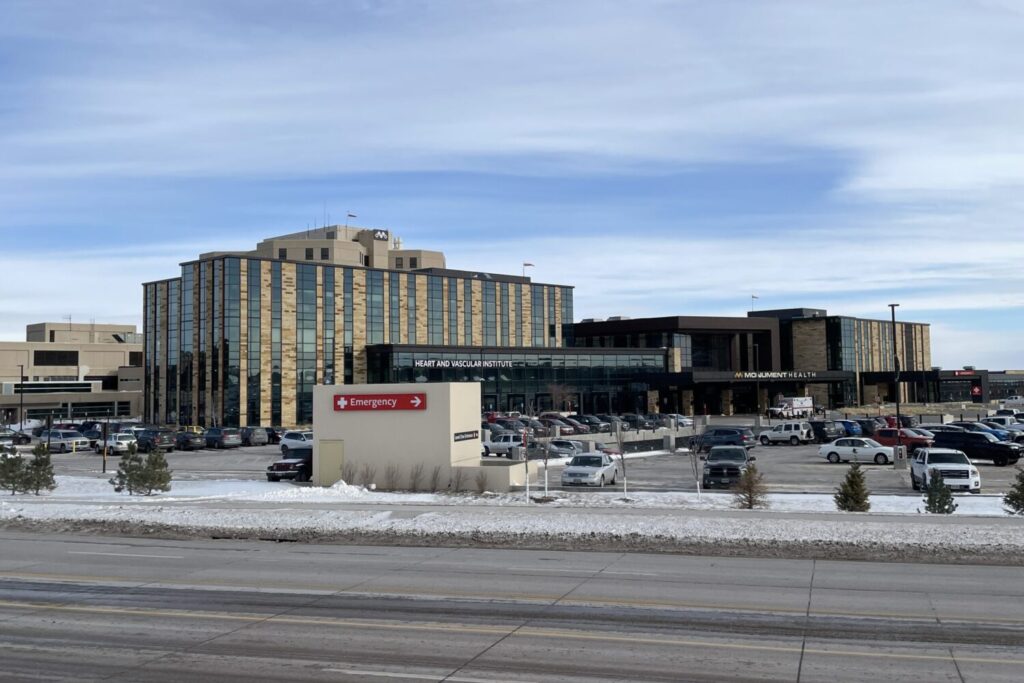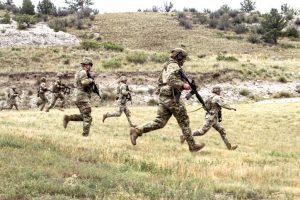The main campus of Monument Health in Rapid City, South Dakota, on a December day in 2022. Monument Health is one of three major health systems in South Dakota, where state officials have applied for $1 billion from a new federal rural health fund. (Photo by Seth Tupper/South Dakota Searchlight)
If South Dakota is awarded the $1 billion it’s seeking from a new federal rural health fund, half of that money will be used to modernize telehealth and data-sharing efforts.
All 50 states applied to the $50 billion Rural Health Transformation Program. Congress included it in the One Big Beautiful Bill Act, in response to concerns that the bill’s Medicaid cuts will hurt rural health providers. Medicaid is a federal-state program that provides health insurance for people with disabilities or low incomes.
According to KFF, federal Medicaid spending in rural areas in South Dakota over the next decade will decrease by a projected $487 million, due largely to new work requirements in the federal law that will cause some people to lose coverage.
Half of the Rural Health Transformation Program — $25 billion — will be distributed equally to states with approved applications, regardless of each state’s proportion of rural hospitals or population. That means South Dakota will receive at least $500 million, if approved.
States hope to use rural health money to keep doctors, combat chronic disease
The remaining half will be allocated based on the number of rural residents and rural health facilities in a state, as well as the state’s spending plans and policies, among other factors. Applications will be approved by the end of the year.
A key component of South Dakota’s application is a $500 million health infrastructure modernization proposal, which would include creation of a “South Dakota Health Data Atlas.” It would allow health care systems throughout the state to access health data in one “single, accessible platform.” The atlas would address telecommunications needs, equipment, emergency preparedness and cybersecurity concerns.
“The Rural Data Atlas will enable outcome tracking at the community level, allowing providers and health departments to identify gaps, target interventions and measure impact,” the proposal said.
The modernization effort, including grants for providers, would expand health providers’ use of electronic health records and telehealth platforms in the state.
About 77% of the state’s critical access hospitals are in eastern South Dakota, with western communities facing up to 120 miles one-way to reach care. Because of that, the application focuses heavily on regionalization, prevention, and technology and self-monitoring efforts.
In addition to the modernization effort, South Dakota’s application includes the following proposals.
Sustainability grants
$125 million to fund grants incentivizing South Dakota health care providers to explore regional assessments and partnerships to “strengthen coordination and sustainability.” Providers could also use the grants to improve professional and management services that could impact a facility’s bottom line.
Such partnerships will “drive sustainable improvements” and “allow hospitals and clinics to coordinate services, offer complementary care, and achieve measurable quality gains and strengthen financial stability,” the proposal said.
Emergency Medical Services regionalization
$64 million to incentivize the creation of regional emergency medical service hubs to reduce response times and offer professional development and improved technology. The state has already dedicated millions of dollars toward technology upgrades for emergency medical services, and issued a report on emergency medical service sustainability recommendations in recent years.
South Dakota officials hope funding for the effort will improve emergency response times and increase the emergency medical services workforce by 15% over the next two years.
New Medicaid payment model
$62.6 million to support a new Medicaid payment model that would provide more predictable revenue to health care systems, reward quality and allow facilities to maintain comprehensive services in rural areas of the state.
Recruit rural health professionals
$62.5 million to provide recruitment incentives, such as sign-on bonuses, relocation assistance and rural service stipends, to remove barriers and make rural health care positions more competitive. The program would include five-year sign-on commitments for the incentives and expand apprenticeship programs. State officials hope to recruit 500 rural professionals by 2030.
Certified community behavioral health clinics
South Dakota does not have any certified community behavioral health clinics in the state, which provide mental health and substance use services to anyone who seeks them, regardless of insurance or their ability to pay.
Using $56.4 million, the state would establish at least one health clinic in each of the state’s behavioral health regions to improve access to care statewide. The initiative would also establish one mobile crisis team and one crisis stabilization facility per region to reduce emergency room visits and jail holds.
Chronic disease management
$45 million to improve chronic disease management across the state. That would include funding rural health care providers, pharmacies and schools to implement chronic disease management and interventions. It would also include improving remote patient monitoring technology use, such as implementing a blood pressure monitoring program and management workshops throughout the state, and offering more resources and support to caregivers in the state.
Establish regional maternal and infant health hubs
$24 million to analyze maternal health gaps — service shortages, social services and supports, workforce needs, and regulatory and payment barriers — and then fund three health care entities to create regional maternal health hubs. The hubs would use a combination of telehealth and remote monitoring technologies in addition to in-person visits to address transportation and accessibility issues in rural and tribal areas of the state.
Create a health care training and resource hub
$4.7 million to provide physicians, nurses, community health workers, emergency medical service providers, doulas and other health care workers with online training and events. Some training would be specific to rural needs — including behavioral health, telehealth, chronic disease prevention, and maternal and child health.
Strengthen community health worker numbers
$3.5 million to support the growth of community health workers in the state’s health care system, including helping with Medicaid claims and creating Medicare billing pathways for the providers. South Dakota has 180 certified community health workers, who help patients navigate health care systems due to language or cultural barriers, and the state hopes to increase that to 300 by 2030.
GET THE MORNING HEADLINES.





